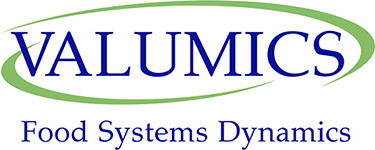VALUMICS will improve knowledge on food chains and their underlying drivers
New quantitative empirical knowledge will be built on food value chain and network dynamics and their variation among chains and contexts (price transmission, impact of innovations, power distribution, institutional changes etc.). The practical significance of drivers and determinants of resilience, integrity and sustainability and their relation to performance will be disclosed and fed to quantitative theory and modelling use and to future scenarios. As a result, improved policy and institutional frameworks will have improved capacity to expand food chain performances from current models of production and processing to more sustainable paradigms. Understanding of the drivers and results of contractual agreements and commonly used practices in the industry will be a basis to create analytical and simulation tools that will allow regulators to explore a wide variety of scenarios and interventions. Consequently, there will be improved capacity to model the sustainability and resilience of food chains, to tailor sustainability governance and to predict the impact of future changes.
The key barriers to achieving an efficient functioning of food supply chains will be identified
VALUMICS will deliver a comprehensive assessment of all dimensions of the sustainability, performance and resilience of food chains and their contribution to jobs and growth, both territorially and at EU level. The key barriers to achieving an efficient functioning of food supply chains will be identified, while taking into consideration their impact on employment and economic growth at both local and EU levels.
VALUMICS will improve capacity to model the sustainability and resilience of food chains
resulting in prototypes/designs for further developing of easy to use modelling dashboards, suitable for policy makers in government, and industry. The cross referencing of the integrated causative-based model implemented, and the input from the event-driven approaches will enable a better understanding of food chain dynamics, sustainability and resilience.
VALUMICS will improve capacity to model the functioning of food chains
upstream and downstream — and thus assess their sustainability and resilience. In the qualitative and quantitative analysis, and through causality-based modelling, the functioning of the value chains in both directions, and price transmissions will be addressed to elucidate data for the modelling work, and forecasting and policy options synthesis.
VALUMICS will properly capture the strength of consumer demand
The dynamic causality-based research framework in VALUMICS will increase capacity to map the occurrence of unfair practices in the food chain and develop approaches to assess their (economic, environmental, social etc.) impact. VALUMICS will properly capture the strength of consumer demand linkages to producers local as well as in export driven chains. As export / import balance weakens this link, mapping and understanding of this will be included in the analysis.
VALUMICS will clarify the development of added value and profit margins
in food value chains and how these are distributed at each level. Improved understanding of food chain and network dynamics is gained through an integrated VALUMICS framework approach.
VALUMICS will allow policy-makers to close knowledge gaps of consumers
VALUMICS will increase understanding of how consumers’ demand and consumption patterns affect the organization of food chains (and vice versa), and their sustainability and resilience. Improved knowledge on how current consumer behavior and lifestyles influence food value chains will be gained in the case study work with the aim of identifying the underlying drivers, determining future trends, challenges and opportunities based on current research on forecasting of consumer behavior. By analyzing the key drivers that determine consumers’ behavior and purchasing decisions, VALUMICS will allow policy-makers to close knowledge gaps of consumers (e.g., through campaigns) and create incentives to steer sustainable consumption patterns.
VALUMICS will motivate options for innovative business strategies and policy recommendations
VALUMICS will improve the capacity of relevant policies and food chain stakeholders to improve food chain sustainability and resilience. The synthesis of findings using the integrated dynamic system modelling approach will motivate options for innovative business strategies and policy recommendations and thus provide an evidence-based road map for policy-makers and different food chain stakeholders, from primary producers to business associations, to improve food chain efficiency, sustainability and resilience, at both national and EU levels. This includes enriched, justified views of the plausible futures of sustainable, resilient, efficient and fair food value chains and network dynamics, through better understanding, and tools to achieve such food value chains. VALUMICS research results will serve as a basis for producers and suppliers to engage into a meaningful and relevant dialogue and they will be able to better identify and adjust their efforts to respond to current and future demand benefitting from modelling dashboard designs, and scenario results and policy options.

